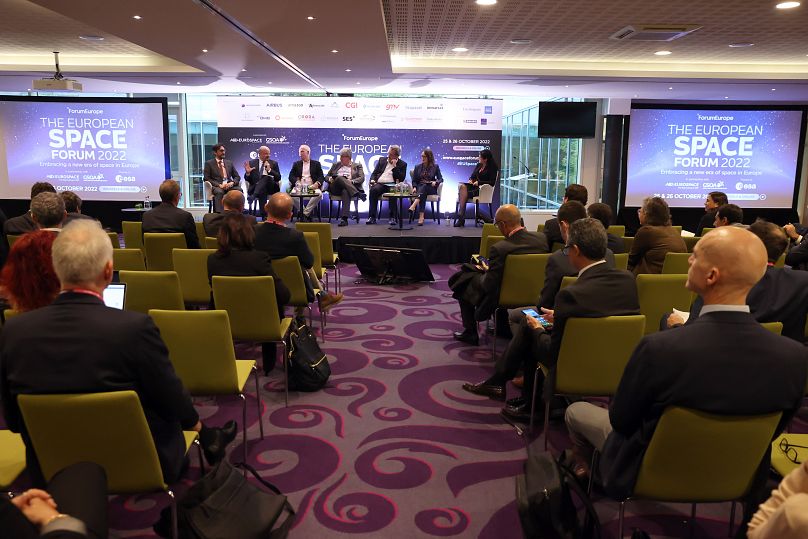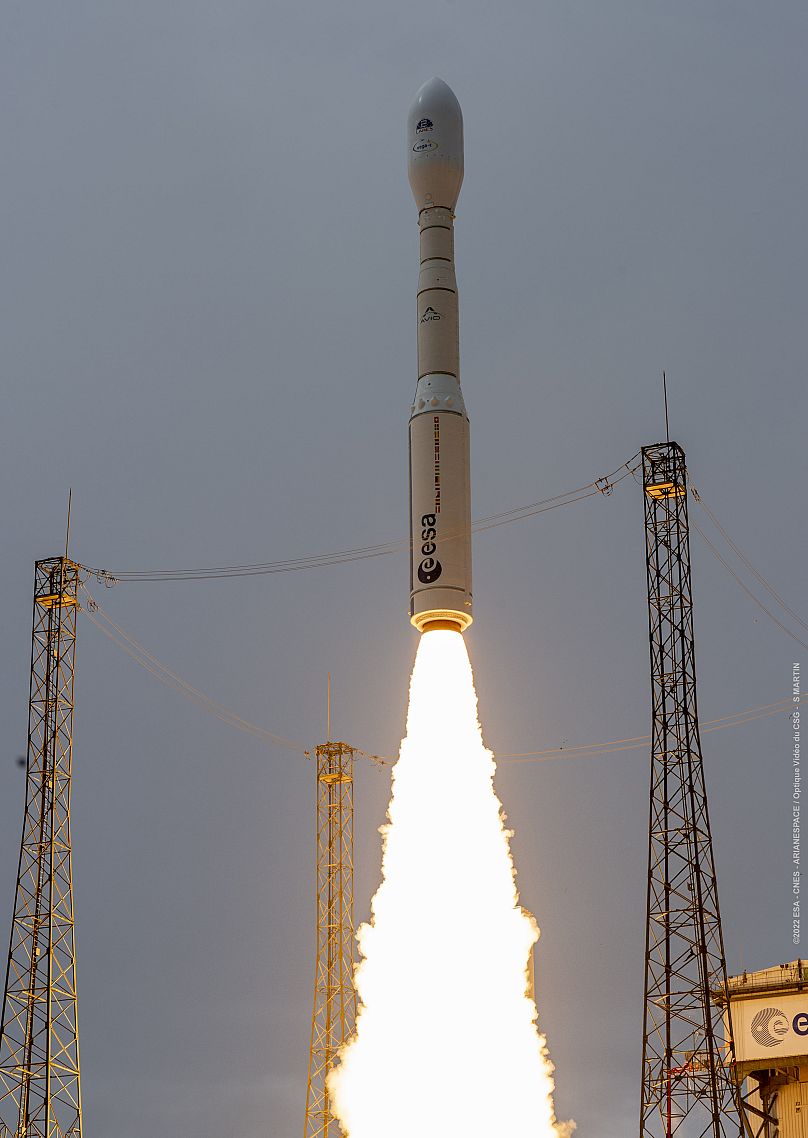The European Space Forum 2022 takes place this week in Brussels.
Europe's space sector is debating this week how to find the perfect balance between encouraging a dynamic new commercial sector and taking into account hyper-sensitive questions around sovereignty and security.
 ADVERTISEMENT
ADVERTISEMENT
 ADVERTISEMENT
ADVERTISEMENT
Finding the best compromise on those two issues is at the heart of discussions this week at the European Space Forum 2022 in Brussels.
The two-day conference has attracted 700 industry leaders in a hybrid format, with the European Space Agency's Director General opening the event in a keynote speech.
Josef Aschbacher stressed the need for more private investment into European space exploration, while at the same time making reference to strategic concerns over Russia's war in Ukraine.
"Events of this year show that space tools are indispensable for a strong and independent Europe," he said.
It makes for an apparent contradiction: Europe says it wants to become an independent space power, while it encourages a fast-growing commercial space sector.
Can you have both? It's difficult, because a lot of the firms eyeing the EU market and setting up shop within the bloc are linked either directly or indirectly to a parent company from Asia or North America, and even pure EU players may rely on technologies or launch services supplied by non-European third party companies.
How does Europe find the right balance?
One woman at the heart of that search for the right balance between security and commercialisation is Evi Papantoniou, Deputy Director for Space and the Head of the Space Policy Unit in the European Commission.
She told the EU Space Forum 2022 that the European Commission needs to ensure autonomous, reliable and cost effective access to space by financing a new breed of launchers, something it is doing by spending Horizon Europe research funding and the EU's new Cassini venture capital funds to help entrepreneurs.
Papantoniou also gave some hint of how the European Commission perceives the future of the secure connectivity constellation, a large-scale project to launch a fleet of un-hackable communications satellites announced in February by Commissioner Thierry Breton.
How the constellation is built, launched and run will indicate a great deal about Europe's longer-term space policy direction.
The argument for the constellation is that the EU does not have its own space-enabled network to share information away from prying eyes, so the "Union Secure Connectivity Programme", as it's called, aims to offer quantum key encrypted messaging service for European governments.
Later, it will also offer a commercial satellite internet service for poorly-connected and rural areas.
Papantonious said the project needed to have a spirit of "open strategic autonomy", a new term that leaves a lot of room for interpretation and debate around the word 'open'.
It's a concept that was discussed at the forum with several speakers convinced the recent addition of 'open' means that pragmatism has won over a more hardline stance of requiring all the satellites to be produced, launched, and operated by European players.
Europe already has its own high precision navigation system, Galileo, and a unique Earth observation network in Copernicus. Both were set up to sidestep reliance on American equivalents, which could be either downgraded or blocked by the US government.
But the secure connectivity programme is somewhat different, because the project comes at a time when private companies are already building and offering similar satellite broadband services such as Space X's Starlink, Amazon's Kuiper, or OneWeb, which is owned by an Indian multinational, the UK government, and France's Eutelsat.
With such a strong list of well-funded players in this market and limited potential for more than five or six constellations in orbit, many ask if the European Commission would be best working with these companies, and switching its attention instead to the quality and security of the end-user services that can be offered, rather than pursuing a unique stand-alone system.
Some established European space players are dead set against that idea. In a pre-event discussion, Evert Dudock, Vice President of Connected Intelligence at Airbus asked delegates, "Can we really afford to be relying on Amazon or Starlink for a whole system? I would be very uncomfortable if we were not independent."
Another speaker echoed that sentiment.
Andre-Hubert Roussel, president of industry trade association Eurospace said that secure connectivity "needs to be fully reliant on European capabilities".
Amazon representatives in Europe counter that it is not who owns the system that matters, pointing to the multitude of ocean telecommunications cables that connect the world, many of which are owned and managed by commercial companies serving governments.
Their argument: why should satellite communication be any different?
A Commission insider told Euronews that one model for this constellation is for governmental high security instruments to be built in the EU under state contracts, sitting alongside commercially operated satellite broadband equipment on the same spacecraft.
Have we got enough rockets?
Getting to space has never been easy, and right now the availability of launchers is a serious bottleneck for Europe's space ambitions.
The veteran Soyuz launcher operated by Arianespace from French Guiana is no longer available, as Russian partners pulled out of the cooperation and the long-awaited new Ariane 6 launcher continues to face delays. Slated for its first launch in 2020, the European Space Agency recently said it will not make its inaugural launch until the fourth quarter of 2023.
What's more, future launch bookings on the Ariane 6 from the likes of Amazon's Kuiper project eat into capacity for other institutional and commercial spacecraft to make it into orbit.
"It's the next big problem we need to fix," said a Commission insider.
Europe's smaller Vega C launcher has its own share of woes, too. Its upper stage engine is made by Ukrainian company Yuzhmash, and although there is reportedly goodwill to continue working together, the situation is challenging, with only a handful of engines said to be left in stock at Vega C producer Avio in Italy.
Solutions are emerging. The fast-growing Rocket Factory Augsburg is developing a small launcher for Earth observation satellites over up to 1,300 kilograms and recently signed deals with both the German space agency DLR and the ESA.
However, it has yet to fly even once. Other new European rocket firms are set to arrive on the scene later this decade, too, focused on the Low Earth Orbit market to orbit broadband and Earth observation spacecraft.
Keeping space clean
While launchers require urgent attention, many voices at the EU Space Forum 2022 also called for rapid and concerted action to better manage space traffic in lower orbits, and to find effective and low cost tools to reduce space debris.
Twenty years ago there were around 770 satellites in orbit, today there are around 5,000, and the figure could rise to 100,000 in the coming years if all projects come to fruition.
In the words of Inmarsat CEO Rajid Suri, it could look suddenly "very, very crowded". If left unregulated, orbit debris could make some areas of low Earth orbit unusable, he warned.
Echoing that sense of urgency was Rodrigo da Costa, Executive Director of the European Union Agency for the Space Programme (EUSPA), the body which oversees the operation of space programmes such as Galileo.
He told the crowd that European space traffic management, including avoidance manoeuvres and deorbiting of obsolete satellites needed to be a priority from now on.
You can follow the EU Space Forum 2022 online here: https://euspaceforum.com. Euronews is media partner of the event.












